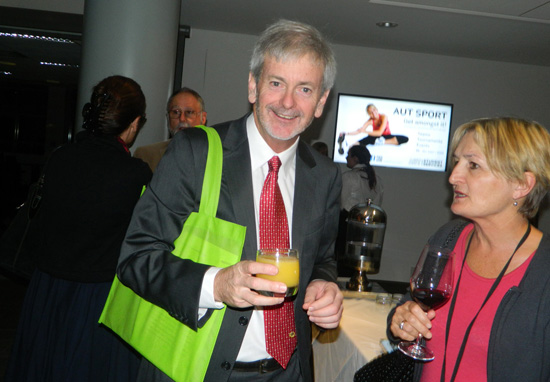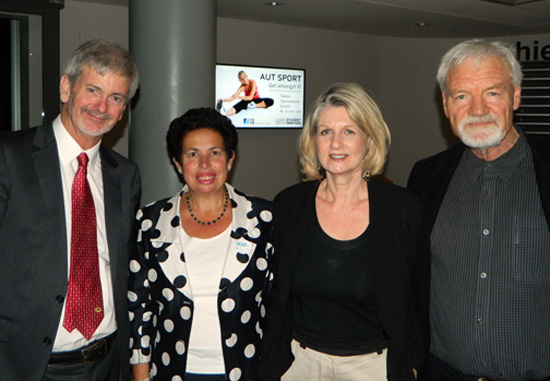
Professor Mark Pearson says the lack of press freedom in the Asia-Pacific region is well documented with media in Malaysia, Singapore, Brunei and Fiji needing government licences to operate, and journalists in Malaysia facing 53-year-old “internal security” laws. But there is also “ever-increasing government regulation of media and social media everywhere”, including the anti-terror laws introduced all over the world since 9/11. Anna Majavu reports.
Media commentators, media freedom advocates, journalists and academics welcomed New Zealand's inaugural UNESCO World Press Freedom Day speech last night with searching questions and lively debate.
Professor Mark Pearson, author of The Journalist's Guide to Media Law, had voiced concern at the high levels of digital surveillance facing journalists today and he urged journalists to adopt a new ethical model of reporting for social good.
Dr Pearson, professor of journalism and social media at Griffith University in Australia and the Australian correspondent for Reporters Without Borders, delivered the inaugural WPFD lecture, organised by AUT’s Pacific Media Centre.
He said the lack of press freedom in the Asia-Pacific region was well documented with media in Malaysia, Singapore, Brunei and Fiji needing government licences to operate, and journalists in Malaysia facing 53-year-old “internal security” laws under which they could be detained for long periods for “prejudicing national security”.
But Dr Pearson added his concerns were not limited to these cases, and that his major worry was the “ever-increasing government regulation of media and social media everywhere”, including the anti-terror laws introduced all over the world since 9/11, modelled on the US Patriot Act.
These laws “typically give intelligence agencies unprecedented powers to monitor the communications of all citizens. There is also an inordinate level of surveillance, logging and tracking technologies in use in the private sector – often held in computer clouds or multinational corporate servers in jurisdictions subject to search and seizure powers of foreign governments” Dr Pearson said.
This had disturbing implications for journalists’ protection of their confidential sources, especially if these sources were government or corporate “whistleblowers”, he added.
Tough for investigative journalism
He described himself as a "media freedom worrier".
Investigative reporters today potentially had to contend with geo-locational tracking of their phones and vehicles, tollpoint capture of their motorway entry and exit, easily accessible phone, email and social media records, CCTV in private and public places, and facial recognition in other people’s images, perhaps posted to Facebook.
In response to Professor Pearson's address, Kiribati Independent editor and publisher Taberannang Korauaba said the Pacific had not progressed in the quest for press freedom for many years.
Philippine Migrant Centre's Del Abcede pointed out that in the Philippines, the so-called "E-Martial law", temporaily suspended legislation prohibiting citizens from criticising the government online with penalties of up to 12 years' jail for "cyber libel", would have serious implications for the whole of the Pacific if this law was copied in the region.
"If you click, share or like [cyber libel], you would also be penalised" she said.
AUT communication studies associate professor Dr Wayne Hope pointed out that when social media users wrongly identified 16-year-old runner Salah Barhoum as one of the "Boston bombers" recently, this was more like "anti-journalism".
Dr Pearson said his greater regret was that the New York Post had run with the information. "Traditional media will have to distinguish itself by its verification mechanisms, and by holding back a little if it wants to be the authoritative source" of news.
Calls for media critiques
There were also calls for the media to critique itself. Dr Camille Nakhid, Pacific Media Centre acting advisory board chair and a senior lecturer in AUT's School of Social Sciences, questioned whether there was wisdom in advocating for press freedom for corporations whichy were already very powerful and only used their voices to promote corporate interests.
Journalism lecturer Richard Pamatatau agreed, saying journalists either failed to report on minorities or wrote stereotyped "festivals and famine" stories.
"I'm left pondering ...the white privilege of press freedom," he said.
Dr Philip Cass, Unitec's Communication Studies postgraduate programme leader, asked how news organisations could be prevented from publishing such foolishness if there were no controls imposed.
"It was a mistake by the mainstream news organisations taking it that far. They are trying to host the conversation...and are facing a losing battle," replied Dr Pearson, suggesting that news outlets which delivered "credibility" and something new were more likely to survive the current changes in the media industry.
Earlier in the evening, Tim McBride, human rights lawyer and member of the UNESCO sub-commission on communications, reported that one journalist had been killed every week over the past 10 years, with 20 killed so far this year.
In the region, the situation in the Philippines was particularly dangerous with more than 70 journalists having been killed there in the last decade.
Crimes of impunity
Most of the people or organisations that commited crimes against journalists did not get caught, or were not punished if they were caught, McBride said.
He cautioned that there were also limitations to freedom of expression in New Zealand and warned that new laws against cyberbullying could be one.
Veteran social justice photographer John Miller pointed out that one of the obstacles to press freedom were mining billionaires like Gina Rinehart and those in Israel who were bankrolling a new right-wing newspaper in a bid to put more progressive newspapers out of business.
Professor Pearson said mainstream media had always been owned by big business but it was encouraging that there was a little space where if something was published really significant, "we can get the news out around the world".
Anna Magavu is a journalist and Master of Philosophy student in AUT University’s School of Communication Studies.

This work is licensed under a Creative Commons Attribution-NonCommercial 3.0 New Zealand Licence.
This work is licensed under a Creative Commons Attribution-NonCommercial 3.0 New Zealand Licence.

WPFD AND PACIFIC MEDIA CENTRE
'Press freedom worrier' stirs lively responses
Michael Sergel's audio interview
Media academic warns over digital surveillance, seeks new media ethical model
Daniel Drageset's Pacific Media Watch interviews - 1 Pacific | 2 Australia, NZ
Mark Pearson on Radio NZ's Mediawatch
Mark Pearson's New Zealand Herald interview
Watch the full lecture on AUT On Demand
Bruce Hill interview on Radio Australia
Tim McBride's Introductory remarks
Café Pacific on World Press Freedom Day




